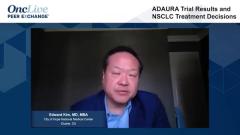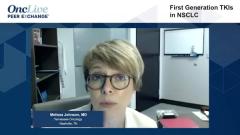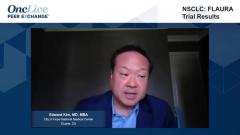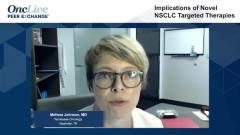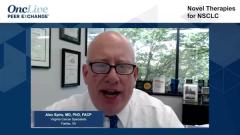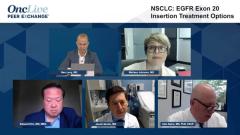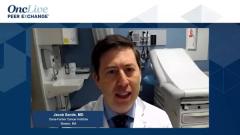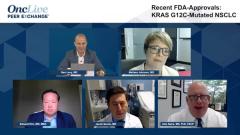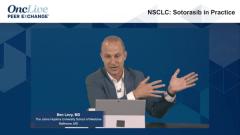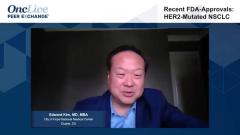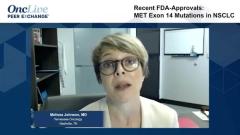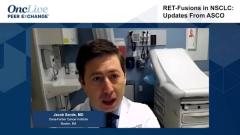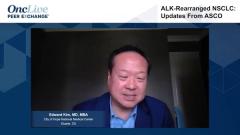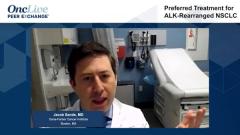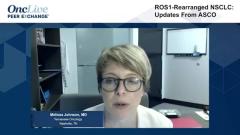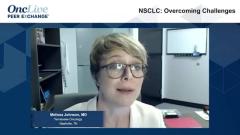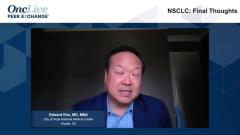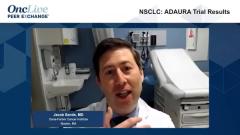
NSCLC: ADAURA Trial Results
Ben Levy, MD, leads a discussion about the evolution of precision medicine in non–small cell lung cancer (NSCLC) beginning with an overview of the results from the ADAURA trial.
Episodes in this series

Ben Levy, MD: Hello, and welcome to this OncLive® Peer Exchange® titled “Evolution of Precision Medicine in Non–Small Cell Lung Cancer.”
I’m Dr Benjamin Levy. I’m an associate professor at Johns Hopkins School of Medicine [in Baltimore, Maryland], and it’s a pleasure to have a wonderful faculty joining me today. I’ll allow them to introduce themselves. We’ll start with Dr Melissa Johnson.
Melissa Johnson, MD: Ben, thanks for having me. I’m Melissa Johnson. I’m the director of the Lung Cancer Research Program and the associate director for drug development [at Sarah Cannon Research Institute] in Nashville [Tennessee]. I’m a medical oncologist and a partner in Tennessee Oncology and One Oncology.
Edward Kim, MD, MBA: I’m Ed Kim. I serve as the physician-in-chief City of Hope Orange County as well as the vice physician-in-chief for the City of Hope National Medical Center [in Duarte, California]. I’m a thoracic medical oncologist.
Ben Levy, MD: Thanks, Ed. Next, coming straight from clinic, Dr Jacob Sands.
Jacob Sands, MD: I’m Jacob Sands. I’m a thoracic medical oncologist at Dana-Farber [Cancer Institute in Boston, Massachusetts]. What an all-star lineup. I’m so happy to join all of you. Thank you.
Ben Levy, MD: Last but certainly not least, Dr Alex Spira.
Alex Spira, MD, PhD, FACP: I’m Alex Spira. I’m a thoracic medical oncologist with Virginia Cancer Specialists [in Fairfax, California] and a co-chair of the Thoracic Research Program with US Oncology. Nice to be here.
Ben Levy, MD: Great to have you all. This will be a wonderful discussion. Today we’re going to discuss a number of topics pertaining to the use of targeted therapies in oncogene-driven lung cancers. We’ll discuss the latest research in the field and the impact of recent clinical trial data, specifically at ASCO [American Society of Clinical Oncology Annual Meeting], on making decisions around treatment selections. Let’s get started with our first topic. Appropriately we’re going to be talking about EGFR first, clearly the leading edge of the personalized story for lung cancer.
We’ve thought about using targeted therapies for EGFR in the advanced-stage setting. We’ve got good data. But we’re starting to learn how to leverage these drugs in earlier-stage disease, and perhaps 1 of the more important trials that came out recently is the ADAURA data looking at adjuvant osimertinib for EGFR-resected lung cancer. Jacob, do you want to walk us through those data?
Jacob Sands, MD: This was first presented at ASCO last year. Just to remind everybody, these were patients who had stage IB to IIIA, 7th edition [of the American Joint Committee on Cancer Lung Cancer Staging], patients who essentially qualify for adjuvant chemotherapy who then got chemotherapy or, in some cases, didn’t—which we’ll discuss—and then were randomized to 3 years of osimertinib or placebo. The hazard ratio on this for the disease-free survival was superimpressive. The separation of the curves created a lot of buzz around disease-free survival. There isn’t much overall survival. It also led to a Twitter debate as well, which has been fun to watch. At the same time, this is impressive disease-free survival. Does it lead to overall survival? That’s still a question mark. The debate has been around how much disease-free survival can substitute for overall survival.
One of the things I’ll point out came out in publication in the New England Journal of Medicine. What I liked more about the initial presentation was the showing the survival curves of stage IB, stage II, and stage III separately. When seeing those 3 separately, the stage II and stage III were really impressive separations. Stage IB wasn’t quite as impressive. In the publication it wasn’t presented that way. It was presented as greater than, as a whole population essentially. Stage II/III it didn’t show that nuance within the publication.
One important point about this was that about 45% of patients didn’t get chemotherapy. From the presentation in 2020, it sounded like the majority of those were really IB, although I don’t remember seeing that completely defined. That’s a high percentage of people not getting adjuvant chemotherapy, which is a proved benefit. In the IB area, that could be debated for individuals, although is the standard of care. I was disappointed to see that number of people not get adjuvant chemotherapy.
What this has sparked, in my mind—and I’m interested in everyone’s impression of this: Because stage II and III have impressive separation, without overall survival data, should it be the standard of care? I’ll be interested to see those overall survival data. When it comes down to that classic question, “If it was you, what would you do?” In stage II and III, I lean toward getting it. We know it’s well tolerated. That separation, until we have overall survival data, is certainly compelling. In IB, I’d be OK letting that 1 go for myself, but this really has to be a nuanced discussion with individuals about what to do. Although osimertinib is generally very well tolerated, some people have a bit of a problem with it. When there are toxicities that come up, how much is it worth pushing through vs stopping early, for example. There are a lot of questions. I’m interested in all your impressions. That’s my quick overview.
Ben Levy, MD: Jacob, very nice overview. You put your nickel down and said that you would give it potentially to patients who are at least stage II or III, with potentially a shared decision-making in the IB setting.
TRANSCRIPTS EDITED FOR CLARITY


